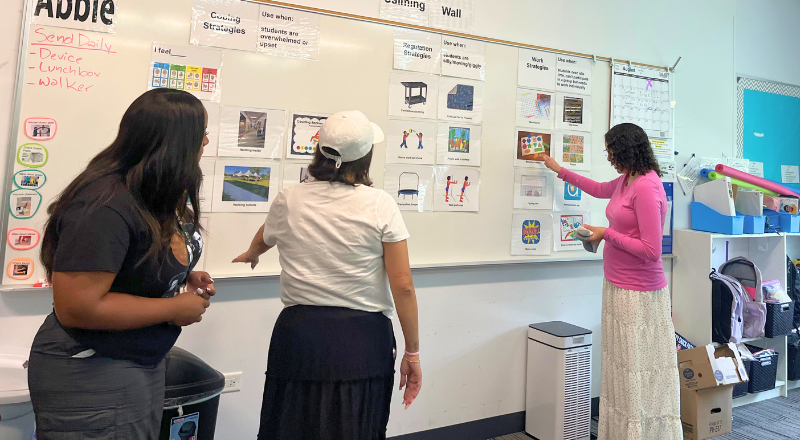For the first time, all students at Keshet High School are navigating a daily routine that mirrors the structure of their same-age peers in mainstream high schools, thanks to a newly introduced block schedule. This shift marks a significant change from the traditional therapeutic day school model, where students typically remain with one teacher for most of the day in a self-contained environment. The new schedule promotes essential functional life skills, such as managing transitions, interacting with different people and time management. By rethinking the conventional approach, Keshet’s education team is empowering students to become more independent and better prepared for success both in and out of the classroom.
With this new block schedule, students are grouped into small cohorts based on their unique learning needs and abilities. Together, they rotate through academic classes, specials, vocational opportunities and social-emotional activities in 50-minute increments, with passing periods to travel between classes and get settled.
The focus is not just on academics—students are gaining invaluable real-world experience in navigating different environments and working with different people throughout the day. This helps students build autonomy and a sense of trust, making them feel more part of the high school community overall. The skills they are developing, such as flexibility, adaptability and communication, are crucial for preparing them for life beyond the classroom.
Staff benefit from this new approach just as much as the students. Previously, working with the same small group of students throughout the entire day could feel limiting at times. Now, with students rotating between classes, staff members interact with a wider range of students, share strategies and collaborate more effectively. This increased communication and problem-solving are enriching their experience and professional growth, especially as they work with a more diverse population.
Although we’re only one month in, we’ve already witnessed so many successes. Students are more engaged in their learning, spending less time on screens and more time doing hands-on activities. The rotation between classes has allowed them to focus more, complete tasks more effectively and engage with their peers in more meaningful ways. With smaller class sizes and increased individualized attention, students feel more connected with their classmates and more comfortable in all areas of the school. Staff have observed notable growth in communication and social awareness, with more students actively using their AAC devices and interacting with one another during class. Overall, students are now more empowered to be active learners and communicators.
As we refine the block schedule throughout the year, our long-term goal remains the same: to prepare students for greater independence and success beyond high school. This initiative is deeply aligned with Keshet’s mission of creating a community of belonging where every one of our participants lives a rich and meaningful life. Whether it’s preparing students to return to their home districts, pursue competitive employment or navigate their community with confidence, this new schedule is laying the groundwork for their future success both in school and beyond.

